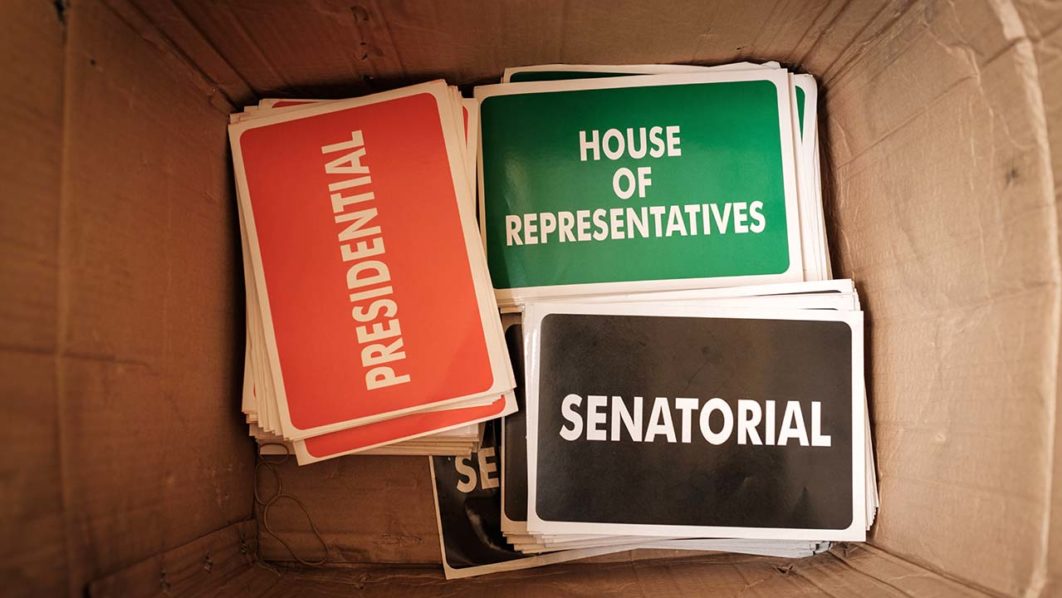 |
| Stickers for ballot boxes are seen during the electoral preparation at a local office of the Independent National Electoral Commission (INEC) in Port Harcourt, southern Nigeria, on February 22, 2019, a day before postponed voting day. (Photo by Yasuyoshi CHIBA / AFP) |
Nigerians today go to the poll to elect their president and 469 members of the National Assembly (NASS).
This is coming a week after the exercise was rescheduled by the Independent National Electoral Commission (INEC) late Friday night (Feb. 16).
While the electoral umpire would conduct only the presidential and NASS election this Saturday, the poll for the governorship and State Houses of Assembly as well as the Area Council election for the Federal Capital Territory (FCT) would hold on March 9.
The election will hold at 119,973 polling units across the country, while collation of results will take place in 8,809 Registration Areas or Wards, 774 Local Government Areas, 36 States and the FCT.
The polling units are expected to open by 8 a.m. and close by 2 p.m. with the last person on the line allowed to vote.
INEC had said that the use of Smart Card Readers and Permanent Voter Cards were compulsory for the elections.
The major presidential contenders are incumbent President Muhammadu Buhari of the All Progressives Congress (APC) and former vice president Atiku Abubakar of the Peoples Demographic Party (PDP).
Others include Prof. Kingsley Moghalu of the Young Progressives Party (YPP), Omoyele Sowore of the African Action Congress (AAC), Felix Osakwe of the Democratic Peoples Party (DPP), and Christopher Okotie of Fresh Party.
For the National Assembly elections, a total of 1,904 are vying for 109 Senatorial seats, while 4,680 candidates are competing for the 360 seats in the House of Representatives.
Specifically, Nigeria’s NASS is made up of 109 members of the Senate or Red Chamber and 360 members of the House of Representatives or Green Chamber.
The total number of registered voters in the country is 84,004,084, with 44,405,439 (52.86 per cent) as male, and 39,598,645 (47.14 per cent) as female.(NAN)
In this article:
This is coming a week after the exercise was rescheduled by the Independent National Electoral Commission (INEC) late Friday night (Feb. 16).
While the electoral umpire would conduct only the presidential and NASS election this Saturday, the poll for the governorship and State Houses of Assembly as well as the Area Council election for the Federal Capital Territory (FCT) would hold on March 9.
The election will hold at 119,973 polling units across the country, while collation of results will take place in 8,809 Registration Areas or Wards, 774 Local Government Areas, 36 States and the FCT.
The polling units are expected to open by 8 a.m. and close by 2 p.m. with the last person on the line allowed to vote.
INEC had said that the use of Smart Card Readers and Permanent Voter Cards were compulsory for the elections.
The major presidential contenders are incumbent President Muhammadu Buhari of the All Progressives Congress (APC) and former vice president Atiku Abubakar of the Peoples Demographic Party (PDP).
Others include Prof. Kingsley Moghalu of the Young Progressives Party (YPP), Omoyele Sowore of the African Action Congress (AAC), Felix Osakwe of the Democratic Peoples Party (DPP), and Christopher Okotie of Fresh Party.
For the National Assembly elections, a total of 1,904 are vying for 109 Senatorial seats, while 4,680 candidates are competing for the 360 seats in the House of Representatives.
Specifically, Nigeria’s NASS is made up of 109 members of the Senate or Red Chamber and 360 members of the House of Representatives or Green Chamber.
The total number of registered voters in the country is 84,004,084, with 44,405,439 (52.86 per cent) as male, and 39,598,645 (47.14 per cent) as female.(NAN)
In this article:
